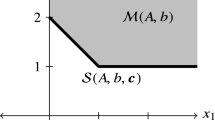Abstract
This paper addresses a class of problems under interval data uncertainty composed of min-max regret versions of classical 0–1 optimization problems with interval costs. We refer to them as interval 0–1 min-max regret problems. The state-of-the-art exact algorithms for this class of problems work by solving a corresponding mixed integer linear programming formulation in a Benders’ decomposition fashion. Each of the possibly exponentially many Benders’ cuts is separated on the fly through the resolution of an instance of the classical 0–1 optimization problem counterpart. Since these separation subproblems may be NP-hard, not all of them can be modeled by means of linear programming, unless P = NP. In these cases, the convergence of the aforementioned algorithms are not guaranteed in a straightforward manner. In fact, to the best of our knowledge, their finite convergence has not been explicitly proved for any interval 0–1 min-max regret problem. In this work, we formally describe these algorithms through the definition of a logic-based Benders’ decomposition framework and prove their convergence to an optimal solution in a finite number of iterations. As this framework is applicable to any interval 0–1 min-max regret problem, its finite optimal convergence also holds in the cases where the separation subproblems are NP-hard.
L. Assunção—Partially supported by the Coordination for the Improvement of Higher Education Personnel, Brazil (CAPES).
L. Assunção—The author thanks Vitor A. A. Souza and Phillippe Samer for the valuable discussions throughout the conception of this work.
Access this chapter
Tax calculation will be finalised at checkout
Purchases are for personal use only
Similar content being viewed by others
References
Aissi, H., Bazgan, C., Vanderpooten, D.: Min-max and min-max regret versions of combinatorial optimization problems: a survey. Eur. J. Oper. Res. 197(2), 427–438 (2009)
Averbakh, I.: On the complexity of a class of combinatorial optimization problems with uncertainty. Math. Program. 90(2), 263–272 (2001)
Averbakh, I.: Computing and minimizing the relative regret in combinatorial optimization with interval data. Discrete Optim. 2(4), 273–287 (2005)
Benders, J.F.: Partitioning procedures for solving mixed-variables programming problems. Numer. Math. 4(1), 238–252 (1962)
Coco, A.A., Júnior, J.C.A., Noronha, T.F., Santos, A.C.: An integer linear programming formulation and heuristics for the minmax relative regret robust shortest path problem. J. Glob. Optim. 60(2), 265–287 (2014)
Codato, G., Fischetti, M.: Combinatorial Benders’ cuts for mixed-integer linear programming. Oper. Res. 54(4), 756–766 (2006)
Côté, J.F., Dell’Amico, M., Iori, M.: Combinatorial Benders’ cuts for the strip packing problem. Oper. Res. 62(3), 643–661 (2014)
Fischetti, M., Salvagnin, D., Zanette, A.: A note on the selection of Benders’ cuts. Math. Program. 124(1–2), 175–182 (2010)
Garey, M.R., Johnson, D.S.: Computers and Intractability: A Guide to the Theory of NP-Completeness. W. H. Freeman & Co., New York (1979)
Geoffrion, A.M.: Generalized Benders decomposition. J. Optim. Theo. Appl. 10(4), 237–260 (1972)
Hooker, J., Ottosson, G.: Logic-based Benders decomposition. Math. Program. 96(1), 33–60 (2003)
Karaşan, O.E., Pinar, M.Ç., Yaman, H.: The robust shortest path problem with interval data. Technical report, Bilkent University, Ankara, Turkey (2001)
Kasperski, A.: Discrete Optimization with Interval Data: Minmax Regret and Fuzzy Approach (Studies in Fuzziness and Soft Computing). Springer, Berlin (2008)
Kouvelis, P., Yu, G.: Robust Discrete Optimization and Its Applications. Kluwer Academic Publishers, Boston (1997)
Magnanti, T.L., Wong, R.T.: Accelerating Benders decomposition: algorithmic enhancement and model selection criteria. Oper. Res. 29(3), 464–484 (1981)
McDaniel, D., Devine, M.: A modified Benders’ partitioning algorithm for mixed integer programming. Manag. Sci. 24(3), 312–319 (1977)
Montemanni, R.: A Benders decomposition approach for the robust spanning tree problem with interval data. Eur. J. Oper. Res. 174(3), 1479–1490 (2006)
Montemanni, R., Barta, J., Gambardella, L.M.: The robust traveling salesman problem with interval data. Transp. Sci. 41(3), 366–381 (2007)
Montemanni, R., Gambardella, L.M.: The robust shortest path problem with interval data via Benders decomposition. 4OR 3(4), 315–328 (2005)
Pereira, J., Averbakh, I.: Exact and heuristic algorithms for the interval data robust assignment problem. Comput. Oper. Res. 38(8), 1153–1163 (2011)
Pereira, J., Averbakh, I.: The robust set covering problem with interval data. Ann. Oper. Res. 207(1), 217–235 (2013)
Spall, J.C.: Introduction to Stochastic Search and Optimization: Estimation Simulation and Control. Wiley, New York (2003)
Yaman, H., Karaşan, O.E., Pinar, M.Ç.: The robust spanning tree problem with interval data. Oper. Res. Lett. 29(1), 31–40 (2001)
Author information
Authors and Affiliations
Corresponding author
Editor information
Editors and Affiliations
Rights and permissions
Copyright information
© 2016 Springer International Publishing Switzerland
About this paper
Cite this paper
Assunção, L., Santos, A.C., Noronha, T.F., Andrade, R. (2016). On the Finite Optimal Convergence of Logic-Based Benders’ Decomposition in Solving 0–1 Min-Max Regret Optimization Problems with Interval Costs. In: Cerulli, R., Fujishige, S., Mahjoub, A. (eds) Combinatorial Optimization. ISCO 2016. Lecture Notes in Computer Science(), vol 9849. Springer, Cham. https://doi.org/10.1007/978-3-319-45587-7_1
Download citation
DOI: https://doi.org/10.1007/978-3-319-45587-7_1
Published:
Publisher Name: Springer, Cham
Print ISBN: 978-3-319-45586-0
Online ISBN: 978-3-319-45587-7
eBook Packages: Computer ScienceComputer Science (R0)




